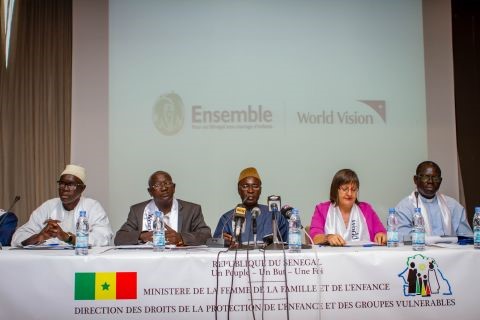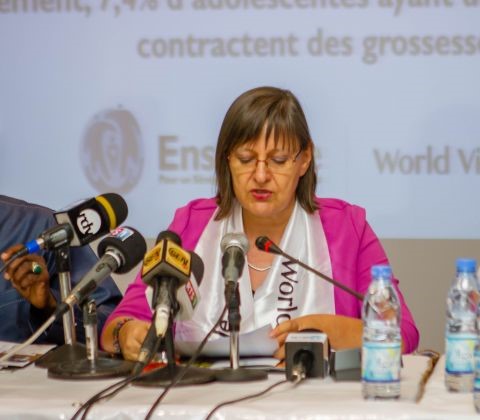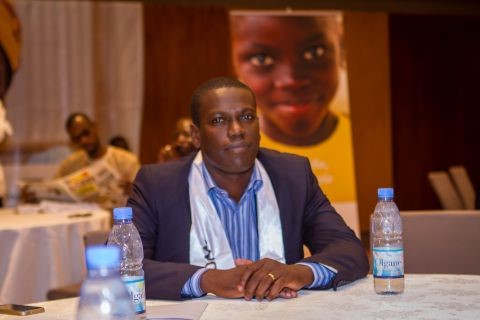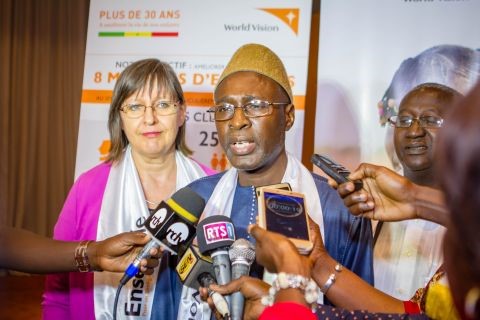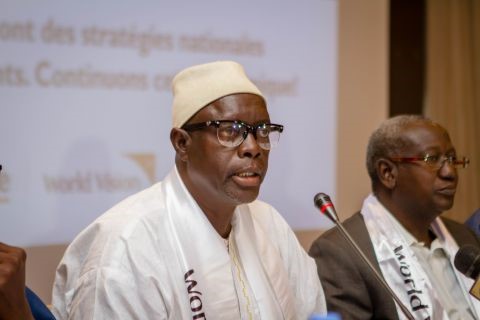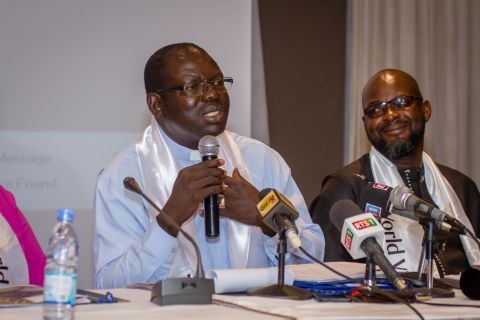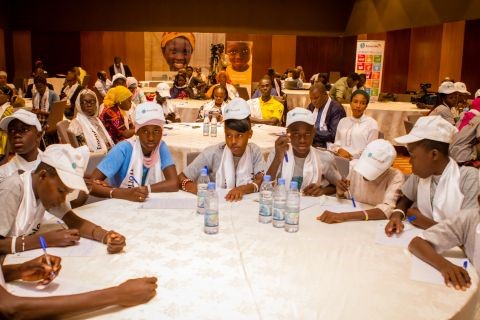World Vision panel: religious leaders unite for the prevention of child marriage
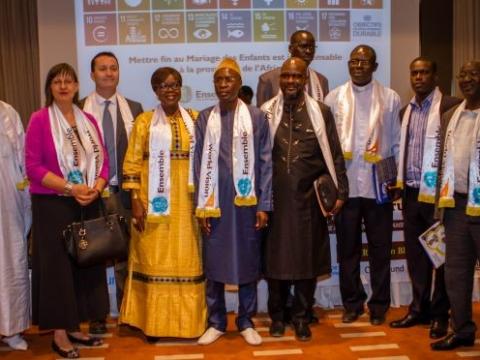
On Thursday 22 June 2017, World Vision invited religious leaders to a panel marking the closure of the 29th National Week of the Child (SNE). Held under the auspices of the Minister for Women, the Family and Early Childhood, Mariama Sarr, the gathering formed part of the campaign called ‘Together for a Senegal free from child marriage’.
The title of the campaign clearly recognises that the issue of child marriage can only be resolved through the involvement of society at all levels, especially religious communities who have a major role to play.
Child marriage in Senegal delivers a serious blow to the country’s economic development by undermining the social and economic capital of the country. Furthermore, the practice has severe consequences for the health of girl-mothers and new-borns; the risk of mother and baby mortality is very high for girls married before the age of 18. World Vision has concluded that these marriages are reaching worrying proportions and not acting to oppose the phenomenon is the same as supporting it.
Mrs Esther Lehman Sow, World Vision Regional Director for West Africa
In her opening speech, the Regional Director for World Vision in West Africa, Mrs Esther Lehman Sow, reminded the assembly that this struggle is not just for one organisation but for each and every one.
“On the basis of our experience in humanitarian work with communities and other partners, we know just how much influence religious leaders can wield. Child marriage can hamper economic development and undermine the human and social capital of a country. This is why I am inviting people with religious convictions to realise the role that they can play and the significant action that they can take in order to put an end to these harmful practices which are like a cancer in society. Just consider the consequences for the health of girl-mothers, and mother and baby mortality,” she said.
Mrs Esther L Sow also added that “each child is created in the image of God. This means that each child has his and her rights and deserves to be able to cherish dreams and ambitions.”
Jean Fréderic Manga, Head of Advocacy at World Vision Senegal
“The religious leaders need to raise awareness in their communities, amongst members of their churches, brotherhoods and their religious families in general, regarding the forms that violence towards children takes. They must leave no believer in any doubt about the presence of this violence in villages, towns and communities,” continued Jean Frederic Manga, Head of Advocacy at World Vision Senegal.
The set of issues surrounding child protection requires particular concentration. The panel organised by World Vision in partnership with the Ministry of Women, Family and Early Childhood is part of this perspective. According to the Director of Rights, Childhood Protection and Vulnerable Groups (DDPEGV), Niokhobaye Diouf, religious arguments exert a strong influence on behaviour-change.
Niokhobaye Diouf, Director of Rights, Childhood Protection and Vulnerable Groups (DDPEGV)
“The DDPEGV is appealing for religious people to get involved in driving back these harmful practices which are so deep-rooted in society.” Reminding the audience of the context of National Week of the Child in which the meeting is being hosted, Mr Diouf also highlighted the commitment of World Vision to end child marriage in Senegal. Hence the theme: ‘The engagement of religious people in child protection and the elimination of child marriage in Senegal’.
Niokhobaye Diouf believes that child marriage is a worldwide phenomenon. “Statistics show that one girl in three is married in Senegal before the age of 18, and that Africa is the most affected continent with 39% of girls married before the age of 18 and 15% before the age of 13,” he pointed out. Which is to say nothing of the detrimental effects of these marriages on the futures of the children. In his opinion, it is a case of ‘all hands on deck’ in order to take on the challenges associated with child protection of poverty, violence, exclusion, ignorance. He proposed to pursue the sustainable development agenda 2030 for children in Africa.
In practice this is a programme that will accelerate the protection and empowerment of the child, but which will also promote the Sustainable Developent Goals (SDGs) which are a major opportunity for putting an end to child marriage in Senegal.
Imam Bamar Gueye, President of the NGO JAMRA
Imam Bamar Gueye, President of the NGO JAMRA, approached the issue of child marriage from the angle of religious believers. First of all, he rejected the concept of early marriage as a pretext for child marriage. He referred to Muslim ‘Fiqh’ law which considers the physical aspect based on tradition in order to approve the marriages of children. Referring to scripture, he mentioned that adopting the right stance requires invoking the responsibility of the state in terms of the law and for establishing the truth.
Abbot Clair Emile Sarr then took the floor and praised the engagement of religious figures in the struggle. “It’s time for us to understand the gravity of this phenomenon which hampers child development,” he signalled.
Abbot Clair Emile Sarr, Curate of the parish Notre Dame of Lourdes of Kaffrine
Over the next five years, the campaign ‘Together for a Senegal free from child marriage’ will try to be a game-changer and prevent millions of vulnerable girls and boys from being affected by the phenomenon.
Children were also taking part
